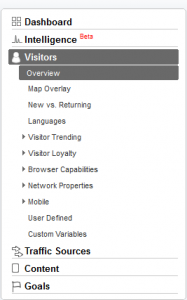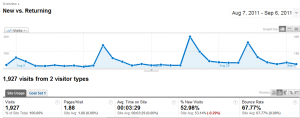Lower Bounce Rates = More Traffic, Here’s How!
In this post I am going to discuss bounce rates and how they are now a very significant factor in ranking websites after the Panda review.
So What Is a Bounce Rate?
A bounce rate is the percentage of visitors that arrive on a web page and leave without taking any further action. It is measured as a % and this metric is taking a far more important role in helping Google to decide rank.
So Why Is It So Important?
Your website or web page bounce rate provides accurate information that tells you how relevant your content is to the search term used by your visitor to find your page. Generally a low bounce rate is good but the exact % varies on the type of website and content your are ranking for. A general rule of thumb is to aim for a bounce rate less than 50%, obviously the lower the better but don’t beat yourself up if its higher. My bounce rate for this blog is currently 67% which is, believe it or not on the low side for this type of blog.
There are many factors that make up your bounce rate and some of them we can do nothing about.
I will highlight some of the classic causes that add to your bounce rates that you can’t do much about so you can focus on any other areas you may be able to address that will help lower your overall rate, remember a lower bounce rate will increase your ranking significantly which in turn will provide more traffic.
Website Increasing In Popularity
If you have a website or blog that is growing in traffic you will start to get more diverse traffic, the more traffic you get the less targeted it will be so this can be a cause to increase the bounce rate, Google will index and rank your site for many keywords that you have no idea you are ranking for, if you have published a post about losing weight and in that post you happen to mention a “Californian beach holiday is a great incentive to loose weight” you may well be ranked for “Californian beach holiday”, a visitor landing on your post on how to loose weight may want to book a holiday and therefore will click the back button almost immediately.
Returning Visitors
If your visitors type your URL into the address bar directly, they are most likely returning visitors and will most probably want to check on the latest posts or news. If there is nothing new since their last visit they will most likely click off without clicking through to any other pages.
Email And Social Media
If a visitor comes directly to an inner page from an email you have sent them or a Social Media site has referred your particular post, they may well read the post and click off with out clicking any more links or other posts, they may again be familiar with your blog or website and are happy to digest the post and click off, these are the classic ways that add to your bounce rate even though they are not technically correct, this is why you will never get anyway near 10% or even 20% for a website with any amount of significant traffic.
Here is a little tip to get a bit more accurate information about your bounce rate using Google Analytics.
After you log in you will see the dashboard, from the dashboard click on “Intelligence” in the top left hand corner as shown here.
Click on th e Visitors > New Vs Returning
e Visitors > New Vs Returning .
.
(Click on the image’s to enlarge)
Here is the dashboard view which now shows the bounce rate of new visitors compared to the returning visitors, if this percentage is lower you are generally doing OK. Here you can see my bounce rate for my new visitors is less than 53% which is acceptable.
So, lets discuss ways in which you can help lower your bounce rate and therefore have far more chance of selling more stuff to your visitors.
I have listed my top 5 tips to lowering your bounce rate, If you work on addressing any of these issues you will see a significant lowering of your bounce rates.
Build A List
By capturing your visitor contact details you are gaining a valuable subscriber who will be a returning visitor and you are also getting a click to your opt in form. List building is essential in any form of marketing and I have a couple of post’s with information on how to start to build a list on this blog.
Publish Quality Content
Pretty obvious you would think but it is still the biggest cause of high bounce rates. It may surprise you that Google does not
know your home page and in its eyes all of your indexed pages could be your home page. Google selects the page they feel best represents the search request so you should put as much effort in to every page of content and ensure it reads very well, looks appealing and provides sold information closely related to the topic of the keyword. Don’t use low quality information to “pad out” your site because the whole site will be penalised for a couple of pages of poor content.
Internal/External Linking And Related Content.
We know since the Panda review Google want to see internal linking to relevant internal and external pages wherever possible. Internal linking is a great way to keep your visitor engaged and therefore lower your bounce rate. Make sure you always link external pages to open in a new window or the click of the link is attributed to the external page not yours and this would therefore add to your bounce rate.
Page Load Speed
Ensure your website loads as fast as possible, a sure fire way to get people clicking on the back button is a slow loading site. Make sure you have no big graphics or videos to load and never add streaming videos with auto play functions, nothing more annoying than a website blasting music or voice overs when first clicking on.
Use Strap lines, Clear Headings And Sub Titles
When we arrive on a web page we need to immediately understand what the page is about and this needs to match the search term exactly, use bold headers and sub headers that leave us in no doubt as to what the page is all about, the longer we have to read to ensure it is the info we are looking for the more chance we will hit the back button.
Spending a little time ensuring all of the above factors are in place and optimized to the best of your ability will significantly improve your traffic because your pages will all rank higher.
Tracking should be an integral part of your online success, I recommend using Google Analytics which is a great free resource, to set up your account click this link, it is very easy to set up the tracking for your websites and you will improve your output almost overnight by being able to collate and compare stats which enables you to take positive action.
As always, comments will be open for a couple of days and I would love to get your feedback.


